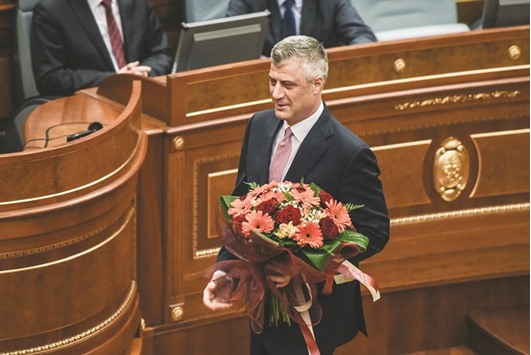Kosovo’s parliament has elected Hashim Thaci as the country’s new president, in a session interrupted by opposition tear gas attacks and as anti-government protests in the streets turned violent.
Thaci prevailed after securing 71 ballots in the third-round of voting, in which 60 votes were needed to win.
The two previous rounds yesterday failed to garner the necessary majority.
The opposition walked out before the first vote.
Security also expelled seven lawmakers for releasing tear gas, forcing the parliament to break off twice.
The opposition, which has fired tear gas in parliament several times since October, accuses Thaci of corruption and promises to continue protesting and demanding snap polls, ahead of their regular date in 2018.
As the voting took place, a crowd of protesters outside began hurling rocks and firebombs at police, who responded with tear gas and water cannon, local media reported.
At least 12 people were injured, 11 of them police officers.
Apparently concerned that a confrontation between rival groups may spark more violence, Thaci called on his supporters to celebrate his election victory at their homes, but a crowd nevertheless gathered in the capital Pristina.
Kosovo, which broke away from Serbia eight years ago, has faced a political crisis for several months, with opposition MPs almost paralysing the work of parliament with regular teargas demonstrations.
Protesters on the streets have also called for the government to step down and hold early elections, amid widespread frustration over alleged high-level corruption, around 40% unemployment and a government deal with Serbia.
The former political leader of the pro-independence Kosovo Liberation Army which fought Serbia in the late 1990s, Thaci has also been accused of involvement in organised crime and organ trafficking during and after the war – charges he strongly denies.
“We continue to oppose the most disputed person in Kosovo being elected president. We will continue with our protests until the convening of new elections,” opposition MP Albin Kurti told the crowd after he was banned from parliament.
Hundreds of protesters had pitched tents in the centre of Pristina earlier this week, pledging to demonstrate around the clock in an attempt to oust the government and prevent Thaci’s election.
“It would be a disaster for Kosovo if he is in power for another five years,” said Agron Mustafa, a 29-year-old unemployed lawyer, saying that Thaci “did nothing” to improve the economy as prime minister from 2008 to 2014.
Opposition leaders are particularly furious over a government deal with Belgrade to create an association giving greater powers to Kosovo’s Serb minority – a move they fear will increase the influence of Serbia.
The deal was reached during talks brokered by the European Union to “normalise” relations between former foes Kosovo and Serbia, in which Thaci has taken a lead role.
Improved relations are a key requirement for both sides to join the EU, although Serbia and its ally Russia refuse to recognise Kosovo’s sovereignty.
Along with Thaci, his close party associate Rafet Rama is running for the presidency, but he won just four votes in the first round.
The government and international observers, including the US ambassador to Kosovo, have repeatedly denounced the opposition’s method of protest.
“We call on all politicians who want what’s good for Kosovo to sit down and find a solution,” said Samuel Zbogar, head of the EU’s Office in Kosovo.
US Ambassador to Kosovo Greg Delawie said the opposition was “interrupting a democratic process.

Thaci holds a bouquet during an extraordinary session in Pristina after the foreign minister and former premier was elected as president.
